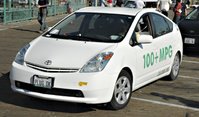Electric cars - a boost for biofuels?
 Wouldn't the introduction of plug-in hybrids and electric vehicles mute the booming demand for biofuels over the long haul? Not according to the French automaker Renault in a recent article posted on the Biopact Blog.
Wouldn't the introduction of plug-in hybrids and electric vehicles mute the booming demand for biofuels over the long haul? Not according to the French automaker Renault in a recent article posted on the Biopact Blog.
Biofuels contribute less than 3% of current fuel usage in the U.S. It could grow considerably before challenging fossil fuel dominance or the gradual introduction of electricity as an energy source. However, the increased reliance on electricity could actually insure that biomass and biofuels provide a longterm alternative. That is because so much electricity is generated using fossil fuels that even if biomass is not being converted into biofuels for the gas tank it is still likely to become the primary alternative fuel source for electricity generation.
Reliance on electricity for vehicle power could also negatively impact the future use of hydrogen as vehicle fuel since the infrastructure for biofuels and electricity are essentially already in place.
Below are excerpts from the article that should be read in its entirety from the original source...
---------------------
Why electric cars and plug-in hybrids mean a boost to bioenergy
French automaker Renault announced yesterday that it will roll out an electric vehicle in 2010 aimed mainly at European fleet markets.
Besides this project, Nissan has also launched a series of programs aimed at speeding up the introduction of 'plug-in hybrids'. GM and Mitsubishi are going electric too, as are a whole series of small manufacturers who are producing electric specialty vehicles, such as light-duty vans, urban mini-cars or heavy-duty trucks.
Despite marketeers' insistence, none of these vehicles are "zero emissions" per se, for the obvious reason that electricity -- just like hydrogen -- is merely an energy carrier, not an energy source. You need a primary energy source to produce the electricity these vehicles' batteries will consume. At the 'tailpipe', electric cars are clean, but this doesn't hide the smokestacks that pump out CO2 at the point where the electricity they use is generated.
The question then becomes: which of these clean primary energy sources is most viable over the long-term?
Renault, for one, considers bioenergy to be the most versatile, most competitive and most universally applicable source for power generation. Biomass is solar energy converted into plant matter that can be transported, distributed and managed in a flexible manner.
Unlike photovoltaic and wind power, biomass can be used everywhere and 24 hours a day. A staggering diversity of energy crops exists that can be used to grow biomass adapted to local agro-ecologic circumstances: from drought-tolerant perennial crops in semi-deserts and grass species in the subtropics, to trees in peri-arctic environments.
The advantage of biomass as the primary energy source for electricity generation is the fact that it can be traded internationally, unlike photovoltaic and wind-power which are locally rooted and can be used economically only under optimal conditions (strong winds in specific locations or ample sunshine). If you want to transport solar energy over long distances, you can only do it by embedding it in biomass; that way, you can ship it over oceans to markets where it fetches the best price. This is impossible with electricity derived from wind or photovoltaics.
The increased attention for electric cars may also signal the final blow to the much hyped 'hydrogen economy'. The main reason why hydrogen is such an unfeasible option for the future, is that it has the disadvantage that the gas is costly to produce, difficult to store and not easy to transport or distribute. The hydrogen economy requires the construction of an entirely new, trillion-dollar infrastructure consisting of pipelines, storage facilities and special hydrogen stations where end users can refill their gas-tanks. This may take ages to build. The electric infrastructure on the contrary already exists. To function as the power instructure for transport, all it needs is some grid-extension and the construction of public recharging outlets.
technorati bioenergy, PHEV, plug-in, hybrid, electric, flex-fuel, ethanol, automobile


No comments:
Post a Comment